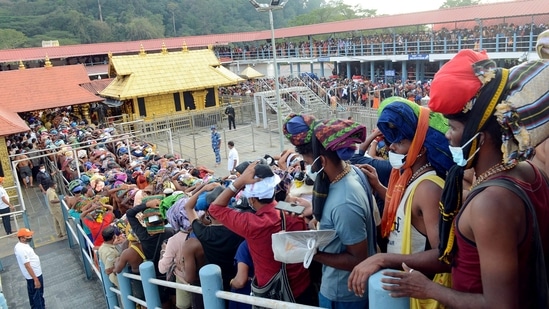What is Kerala's 'halal' food controversy? Explained
The controversy began following the use of halal-certified jaggery to prepare the prasadam at the Sabarimala temple.
The halal food controversy in Kerala which has taken the form of full-fledged campaigning on social media started when it was reported that halal jaggery was being used to prepare 'aravana' and 'appam' in the Sabarimala temple. Now that there are campaigns against halal food, here is all you need to know about the present controversy.

What is halal food?
Halal means permissible in Arabic. Halal food refers to food prepared adhering to Islamic law. For example, halal meat refers to meant procured in a specific way of killing an animal that involves slaughtering it through a cut to the jugular vein, carotid artery and windpipe.
What is the controversy over halal food in Kerala?
> SJR Kumar, a former president of Vishva Hindu Parishad Kerala, approached the high court seeking direction to stop the distribution of Aravana and appam made of halal jaggery in Sabarimala. 'Aravana' is a payasam made out of jaggery and rice, and 'appam' is a sweet rice- and jaggery-based fritter. Both are distributed as prasadam at Sabarimala.
> The Travancore Devaswom Board which runs the temple told the court that the quality of the jaggery used for making prasadam was being tested in the laboratory at Pampa. They also told the court that the quality of the two sweet dishes were being tested in the laboratory at Sannidhanam, before distributing the same to the devotees.
Campaign against ‘halal’ food in Kerala triggers concerns
> Why is there a halal stamp on the packet of jaggery? The Board said that the Maharashtra firm from where they got the packets export them in bulk to Arab countries.
> Dismissing the controversy as motivated, the Board said it was a calculated attempt to attack the reputation of Sabarimala and to hurt the religious feelings of the pilgrims and thereby destroying the communal harmony through various posts published and circulated in social media.
> The Board also said that this particular firm has been supplying jaggery to the temple since 2019.
> As the food controversy is taking a political shape in Kerala, the youth wing of the CPM organised a food street programme in response where various types of dishes, including beef, pork, chicken and biryani were prepared. The party accused the BJP and the Sangh Parivar outfits of mixing religion with food.
> BJP state president K Surendran said there is no check on the rise of Islamic extremism and terror in Kerala and the entire state is flooded with halal meat shops. "...Kerala coming near to becoming Syria, that is the general feeling of the common man," he had said.
> What is spit-free food? In the ongoing campaigning against halal food, people are asking for spit-free food. The petition of SRJ Kumar may have an answer to this.
"The religious scholars of the Muslim community have been proclaiming publicly that saliva is a necessary ingredient for certifying Halal in the preparation of food materials...however, different views were also expressed by a section of religious leaders," the plea of the petitioner said. This might have given birth to the 'spit-free' food campaign on social media.
> The Kerala high court asked the petitioner whether he understands the concept of the word halal. The high court clarified its understanding of the word halal. "The concept of halal says that certain things are prohibited. All other things are halal. This certification only says that those prohibited materials are not included in a particular product," the bench said.






